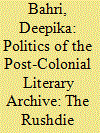| Srl | Item |
| 1 |
ID:
184422


|
|
|
|
|
| Summary/Abstract |
This article looks at how the changing relationship between science and religion from the fin de siècle to the present period continues to influence healing practices in Mongolia. It explores how science and religion, rather than being congenitally antithetical to one another, are frequently co-constitutive. By following a few key historical lineages of spiritualism in their dialogue with the Mongolian cultural region, the article illustrates how ongoing exchanges between science and religion have contributed to changes in contemporary Mongolian urban religious practices. As the article illustrates, science, and/or the idea of science, has resulted in changes to lay religious epistemologies and methodologies. At the same time the prestige of science can be used as a means of underlining the strength of ritual efficacy, particularly within Buddhism. Yet when science or allopathic medicine fails to explain or to heal, science is used as a yardstick against which the transcendent power of ritual becomes evident.
|
|
|
|
|
|
|
|
|
|
|
|
|
|
|
|
| 2 |
ID:
184802


|
|
|
|
|
| Summary/Abstract |
Using the Rushdie papers as a case study, this essay discusses questions of commodification, access, preservation and cultural nationalism related to the acquisition of the literary archives of post-colonial authors. Who should own this archive? What is the archival fate of writers with a tenuous relationship with their place of birth? Finally, how does the well-guarded, commodified, expensively acquired archive privilege aura and secrecy over the treasures in the readily available, published literary corpus? This reading suggests that we need to attend equally to the aesthetic value of the literary imagination as part of the discussion in archival studies.
|
|
|
|
|
|
|
|
|
|
|
|
|
|
|
|